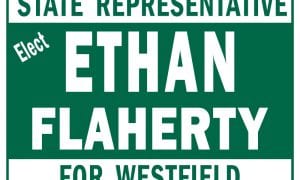
Westfield Department of Public Works employee Earl Sprague unloads an armful of political signs prior to last years election. (File photo by chief photographer Frederick Gore)
SPRINGFIELD – Attorneys for City Councilor David Flaherty and Mayor Daniel M. Knapik met at the United State District Court in Springfield earlier this week and the conference established the schedule for the trial, and pre-trial preliminaries, of the case Flaherty has filed alleging that Knapik illegally ordered the removal his, and other politicians’ signs from private property on East Silver Street and Lindbergh Boulevard.
The documents, made available by Flaherty, establish that the case will come to trial on October 21, 2013. The procedural order warns “The parties are hereby notified, however, that due to the court’s congested trial docket the case may actually be called to trial on any day during the four weeks following.”
Flaherty initiated the case in March after signs promoting his candidacy for City Council, and signs supporting two other candidates which had been posted facing East Silver Street, were removed on Nov. 7, 2011, the day before an election, which saw Flaherty re-elected to his position on the council.
Flaherty’s suit contends that Knapik ordered the director of the Department of Public Works to remove the signs and, in his reply to the suit, Knapik has acknowledged that “the Mayor of Westfield had instructed the City’s Director of Public Works to remove any signs in the tree belt.”
At issue is where the signs were placed.
Flaherty’s complaint alleges “Plaintiff Flaherty’s sign was clearly within private property lines” and goes on to allege that “The sign was placed so as to create no obstruction to the view of drivers and was otherwise in compliance with local sign ordinances.”
Knapik, in his response to the complaint, challenges both allegations.
He asserts that his “directive with regard to the campaign signs was a legitimate exercise of municipal regulations” and further states that the signs “were removed as the legitimate subject of municipal regulations due to their potential, where located, to obstruct views of pedestrians by motorists.”
The recent hearing in district court resulted in a scheduling order which establishes a schedule of actions required by the parties in advance of the trial date.
The required tasks to be completed before the trial starts with completion of automatic disclosures by Aug. 30, 2012 and other steps include disclosure of information regarding trial experts (plaintiffs by March 1, 2013, defendant by April 5, 2013); completion of depositions by April 30, 2013 and any defense motion for summery judgment by May 24, 2013, and plaintiff opposition to such motion and any cross-motion by June 7, 2013, with defense reply by June 19.
District Judge Michael A. Ponsor will hear any motions for summery judgment on June 27.
A final pre-trial hearing is scheduled for Oct. 1, 2013, and the recently issued procedural order stipulates that, by the date of that hearing, the parties in the case are required to meet to accomplish a number of tasks.
The order requires the parties to “discuss and negotiate settlement of the action”, to stipulate all uncontested facts, to narrow the issues to be tried, to show all parties “any and all exhibits to be offered at trial” and to notify all parties of the names and address of all witnesses to be called as well as the qualifications of expert witnesses who will testify.
The procedural order requires that the parties to the case, after their meeting, jointly prepare and file a pre-trial memoranda which includes a concise statement of the evidence to be offered with respect to liability and damages, a statement of facts established by pleadings, admissions and stipulations including all facts not in genuine dispute, the contested issues of fact, any jurisdictional questions, questions raised by pending motions, issues of law, requested amendments to the pleading, the probable length of the trial and type (jury or non-jury) of trial, a list of the witnesses and the purposes of their testimony and a list of the proposed exhibits which distinguishes which exhibits are expected to be introduced with objections.
In April, the city council appropriated $40,000 to fund Knapik’s defense of the lawsuit, as a city ordinance requires the indemnification of city officials being sued.



